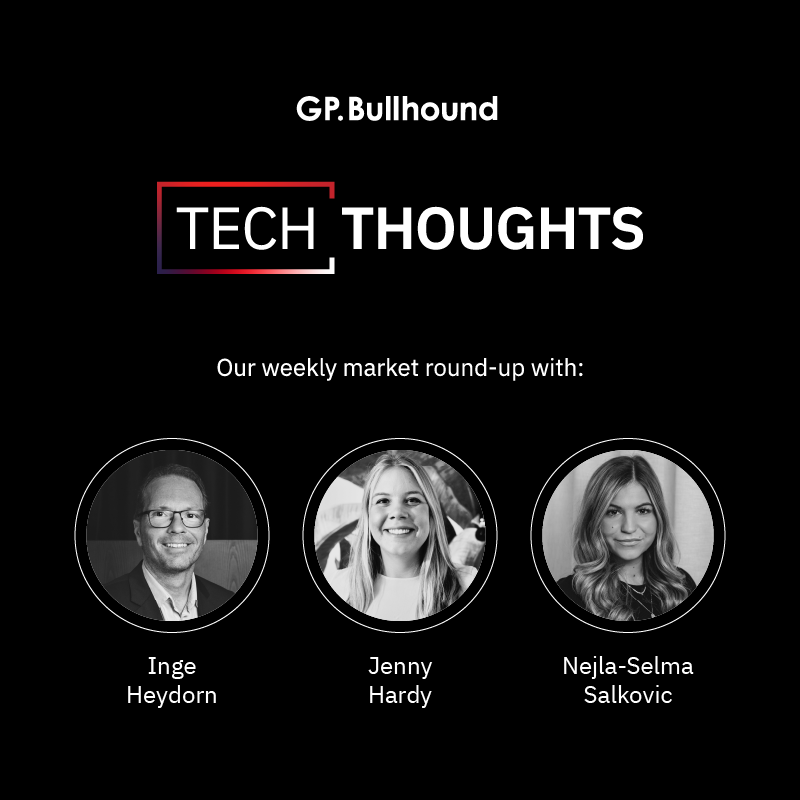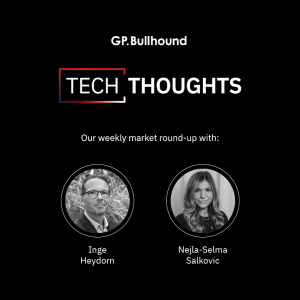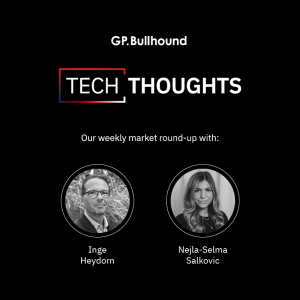Tech Thoughts Newsletter – 25 November 2022.

Still a busy week for tech news and results this week, despite the US holiday. In tech, the word of the week is stability. Let’s see if it stays! Analog Devices reported that they see stability in their semiconductor orders (having talked of a slowdown last quarter), and Xiaomi sees inventory levels for smartphones normalising, and sales levels stabilising in China. Elsewhere, there’s more politics in semis but also some good news for the gaming stocks we own in the portfolio.
We have not made any major changes to our portfolio this week.
Firstly… a surprise Sunday night announcement – Iger Strikes Back..
- The week started with a surprise as Disney CEO Bob Chapek has been replaced by former CEO Bob Iger. And later in the week, the new Bob (Iger) sent an internal memo implying he would restructure the business (presumably reversing Chapek’s move to more centralised content distribution decisions).
- It’s not totally clear to us what Iger will do differently – his last move as CEO was to go all in on Disney+/streaming (and buying 21st Century Fox which played into that).
- There have been some missteps from Chapek for sure – and the last set of results spoke to that, but as far as future strategy goes we question what Iger will do differently. We spoke a couple of weeks ago that we might prefer Disney to focus on its differentiated (predominantly Disney) content (or even taken the Sony approach and be a content seller) – but that is certainly not the path Iger set up for the business 3/4 years ago, nor the one we expect him to take now.
- We continue to question the long-term returns in streaming.
Smartphones worst growth rates for close to 10 years.. But some signs of stability?
- Xiaomi reported its results: There’s been no doubt that the non-Apple smartphone market has been through a tough downcycle this year – Xiaomi commented that global smartphone shipments were at their lowest Q3 level in 9 years.
- However, Xiaomi’s comments this quarter around inventory were more positive, and we have now received a number of datapoints indicating that the inventory levels on the smartphone side are normalising in China.
- This particularly good news given the timing. We’re going into the biggest selling season around the Chinese new year, and going into that with healthy inventory levels will help a lot. India too, looks like we may nearly be through the inventory correction. We’re not at the stage where we want to make a bold smartphone recovery call yet but we keep tracking.
But still no good news in the PC market
- Dell is calling for mid double digit yr/yr decline in overall PC market volumes – the worst correction since 2015. The group’s two divisions illustrated what has been an undoubtedly rough market for PCs (more so in consumer vs commercial – and particularly low end consumer) as commercial revenue fell 13% yr/yr and consumer revenue dropped by 29%.
- HP was similarly impacted by continued weakness, with no real signs of life – and a similar trend of commercial being bad, but consumer being even worse… The company is implementing a restructuring program – running to keep standing still.
- Neither business made any bold statements about any expected recovery in demand..
- We’d note that Target (US retail) and others also have been weak – calling out softness in consumer electronics. As we’ve commented before, it’s hard to imagine many consumers will be rushing out to buy PCs and Notebooks this Autumn given unavoidable cost of living (mortgage, energy costs) increases.
More positively in semiconductors there are still signs that the structural demand is winning out over cyclicality – ADI changes its tone more positively from last quarter
- Analog Devices beat and raised at its results this week. It’s important to note the change of tone from a quarter ago, where it had noted orders slowing and cancellations increasing. Now it is stating orders stabilising:
“As we noted last quarter, the uncertain and slowing macroeconomic environment has had some impact on demand. However, after a couple of months of slowing orders, we saw bookings stabilize during the quarter at what we’d consider relatively normal levels for entering our first quarter.” - It was strikingly clear from the call that the market still doesn’t believe them.
- For us, the tailwinds of auto (albeit ADI is less exposed than some of the names we own) should help – In the mix auto was particularly strong and guided to grow qtr/qtr. Consumer, though weak, as we noted with Xiaomi, might be showing signs of stabilising.
- Infineon (owned) also held a call around its power division, and we also caught up with the company separately.
- We’ve spoken a lot about Infineon benefitting from increasing semiconductor content in the shift to EV, but it is also seeing significant strength outside of auto. Its power semis are needed in areas like renewable energy, EV charging and datacentre/server, which all require increasing switching and power capacity and therefore significant power content growth for Infineon.
European Chips act and Taiwanese Chips Act
- We’ve talked a lot this year about tech sovereignty – with the US Chips Act and China restrictions being two of the most significant events in tech this year.
- At its results last week, Infineon called out its new fab benefitting from the European Chips Act which followed significant announcements earlier in the year: in March Intel made a significant commitment to spend on manufacturing capacity in Europe – €80bn over the next decade including a €17bn leading edge fab “mega-site” in Germany.
- On Wednesday, the EU backed a €43bn chip package, which should be passed into law very soon. The working document provides some details around where the focus will be – they talk of “ first-of-a-kind facilities” which we assume would cover both differentiated lagging edge products (like Infineon) as well as leading edge.
- It still isn’t totally clear to us that Europe is set up to succeed at leading edge manufacturing, and it does open up the potential for market inefficiencies, but again – in the short to mid-term it will be good for tool orders and our semicap equipment spend.
- The Taiwanese Chips Act (much smaller) was also passed last week – effectively a 5% tax benefit – which will benefit players. Not entirely clear to us that Taiwan needed incentives around chips but helpful nonetheless!
China continues to be complicated for semis and supply chains…
- China memory manufacturers CXMT (DRAM) & YMTC (NAND) were both this week rumoured to be unlikely to meet their 2023 outputs, due to constraints caused by the latest US restrictions on exports of advanced logic and memory chips, and related manufacturing equipment and technologies to China.
- CXMT is the largest DRAM manufacturer in China and transitioning to 17nm (which is important as US restrictions are for below 18nm half pitch tech).
- YMTC is a Chinese NAND manufacturer, and has developed 128 layer NAND technology which is now under restriction. It developed this capacity closely with Apple, who, up until earlier this year (when the US government effectively told them they couldn’t), was going to use YMTC memory in its iPhones (the motivation presumably being lower price – NAND being one of the most expensive components).
- The issue with memory as it relates to China is that particularly Flash is used within AI/machine learning – which is still the main reason the US cites for these restrictions.
- Apple’s China/Foxconn woes continue, with further lockdowns and rumoured protests around worker pay and treatment. We’ve said before, Apple’s China supply chain used to be a competitive advantage (taking chips from YMTC would have been a meaningful cost advantage). It now seems to be turning into a liability. It was Tim Cook’s big bet to build out a China-centric supply chain under Steve Jobs, so it will be very interesting where he now decides to pivot.
Phenomenal numbers coming out from Sony and Nintendo..
- Gaming demand had been under pressure for much of this year, due to the weaker economy and also lapping the strong COVID comps of last year.
- However, lately, the demand for great titles has been strong: A few weeks ago we called out that Call of Duty sales had topped $800m during the first 3 days.
- This week, Nintendo (owned)reported that the new Pokemon Scarlet & Violet sales reached 10m units in the first 3 days (setting a new Nintendo platform record). That implies sales of at least $500m (they are also raising prices vs. the last launch). With Switch supply recovering it bodes well for sell through into the quarter.
- Sony (owned) also seems to have a winner with God of War Ragnarok, stating it sold 5.1m in only 5 days. That made it the biggest Playstation Studios launch ever too..
- Good news for our holdings in Nintendo and Sony and we continue to favour gaming companies with strong franchises to leverage.
Other news:
- Autodesk (owned) reported damp results. Its structural long term drivers remain intact around increased adoption of formal software in the building and construction industry. But in the short term, it is seeing macro weakness from its customers (construction – so very sensitive to the current macro) and next year will see mechanical headwinds around its transition to annual billed contracts. We continue to hold, albeit in small size.
- Zoom is still having a tough COVID hangover, issuing a poor Q4 outlook. With growth <5% next year, churn still high, and little in the way of competitive barriers to entry, it looks in some ways even worse than a telco. Not one for us.
A final thought looping back to where we started with Disney and streaming and the potential for infinite supply of content – two fun things to end with:
- Tencent Music Entertainment (the Spotify of China) announced on its call that it had made over 1,000 AI songs, using machine learning to recreate vocals – with one track receiving over 100m streams.
- Then Baidu (China’s Google, but who have been making big AI investments) said this on their call:
“We’re using AI to produce more short videos for our mobile ecosystem. While it is still in a very early stage, we believe AI will allow us to generate short video much faster and more cost effectively than human-generated content.” - AI generated video is a potentially scary thought, and a future world of truly infinite supply of AI generated content would make for a very different end-game strategy for the streaming platforms.
For weekly insights on the latest market updates, please subscribe to our Tech Thoughts podcast.
For more information about Tech Thoughts, please visit https://www.gpbullhound.com/tech-thoughts/.
We provide investors with access to category leading technology companies, globally. Our assets under management have a total value of more than €1bn, and our limited partners include institutions, family offices and entrepreneurs. Learn more about our funds here.
Enquiries
For enquiries, please contact:
Inge Heydorn, Partner, at inge.heydorn@gpbullhound.com
Jenny Hardy, Portfolio Manager, at jenny.hardy@gpbullhound.com
Nejla-Selma Salkovic, Analyst, at nejla-selma.salkovic@gpbullhound.com
About GP Bullhound
GP Bullhound is a leading technology advisory and investment firm, providing transaction advice and capital to the world’s best entrepreneurs and founders. Founded in 1999 in London and Menlo Park, the firm today has 12 offices spanning Europe, the US and Asia. For more information, please visit www.gpbullhound.com.

